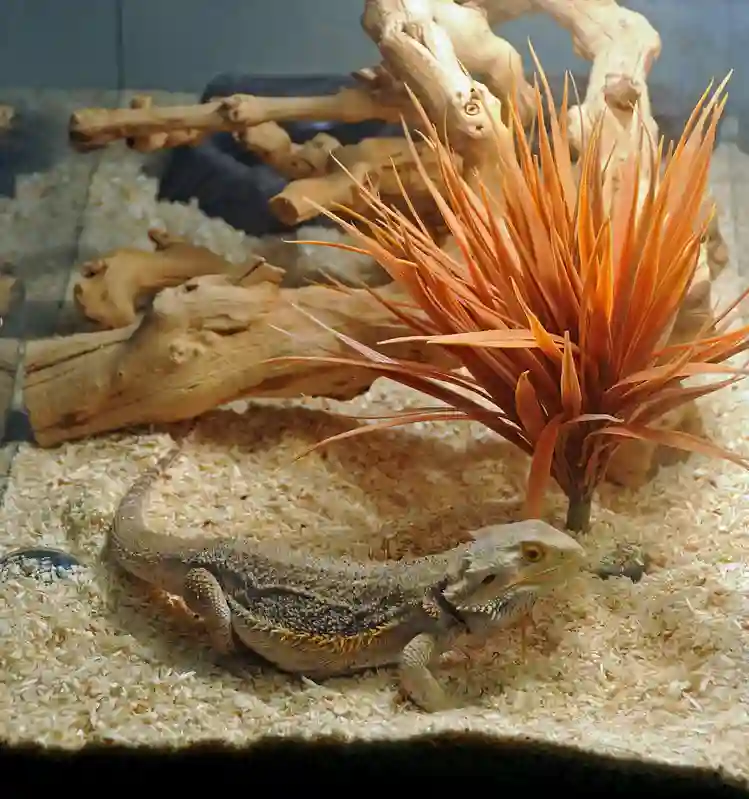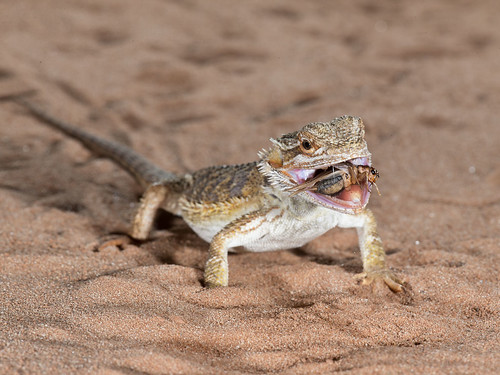If you own a bearded dragon, you might be wondering what kind of substrate to use for their enclosure. Substrate is the material that covers the bottom of the tank and provides a surface for your pet to walk on, dig in, and rest on. There are many types of substrates available for reptiles, such as paper towels, reptile carpet, tiles, bark, and sand.
One type of substrate that is often marketed for bearded dragons is calcium sand. Calcium sand is a type of sand that is enriched with calcium carbonate or calcium sulfate, which are minerals that are essential for bearded dragon health. Calcium sand is supposed to provide a natural and beneficial source of calcium for your pet, as well as mimic their natural habitat in the desert.
However, is calcium sand really safe for bearded dragons? Can they eat it without any problems? In this article, we will examine the pros and cons of using calcium sand for bearded dragons and whether it is a good choice for your pet.
Pros of Calcium Sand
Calcium sand has some advantages over other types of substrates, such as:
- It looks natural and attractive in the tank.
- It allows your bearded dragon to dig and burrow, which is a natural behavior for them.
- It absorbs odors and moisture well, which can help keep the tank clean and fresh.
- It provides a source of calcium for your bearded dragon, which can help prevent calcium deficiency and metabolic bone disease.
Cons of Calcium Sand
However, calcium sand also has some drawbacks and risks that you should be aware of, such as:
- It can be ingested by your bearded dragon, either accidentally or intentionally. This can cause impaction, which is a blockage in the digestive tract that can be fatal if not treated. Impaction can also cause dehydration, constipation, loss of appetite, lethargy, and pain.
- It can irritate your bearded dragon’s eyes, nose, mouth, and skin. This can cause infections, inflammation, ulcers, and abrasions. It can also affect your bearded dragon’s respiratory system and cause breathing difficulties or pneumonia.
- It can alter the pH balance of your bearded dragon’s body. This can affect their metabolism and immune system and make them more prone to diseases and infections.
- It can be expensive and hard to find. Calcium sand is usually more costly than other types of substrates and may not be available in all pet stores or online.
Alternatives to Calcium Sand
If you want to avoid the risks of using calcium sand for your bearded dragon, there are other options that you can consider that are safer and more suitable for your pet. Some examples are:
- Paper towels: These are cheap, easy to find, and easy to replace. They are also absorbent and hygienic. However, they do not look very natural and do not allow your bearded dragon to dig or burrow.
- Reptile carpet: This is a type of fabric that is designed for reptile enclosures. It is soft, comfortable, and easy to clean. However, it can also harbor bacteria and parasites if not washed regularly. It can also get caught on your bearded dragon’s nails or teeth and cause injuries.
- Tiles: These are ceramic or slate tiles that are cut to fit the size of your tank. They are durable, easy to clean, and heat up well under a basking lamp. However, they do not look very natural and do not allow your bearded dragon to dig or burrow.
- Bark: This is a type of wood chips that are sold for reptile enclosures. They are natural-looking and allow your bearded dragon to dig or burrow. However, they can also be ingested by your bearded dragon and cause impaction. They can also harbor mold, fungus, bacteria, or parasites if not cleaned regularly.
Conclusion
Calcium sand is a type of substrate that has some benefits for bearded dragons but also some risks. While it can provide a source of calcium for your pet and mimic their natural habitat in the desert, it can also cause impaction, irritation, infection, pH imbalance, and other health problems if ingested or inhaled by your pet.
Therefore, it is not recommended to use calcium sand for your bearded dragon unless you are very careful about monitoring their intake and cleaning their tank regularly.


